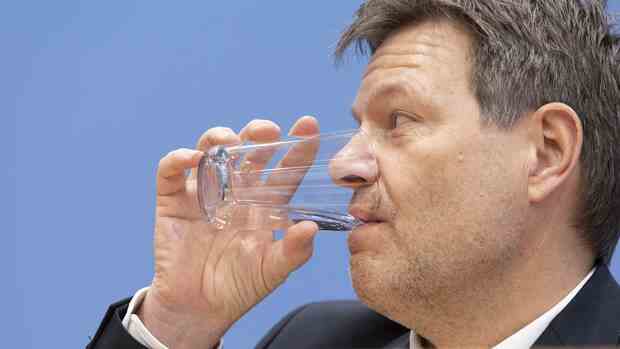Berlin How much influence does the Chinese government have on Hong Kong companies? For the officials in the Federal Ministry of Economics, this is a crucial question. The answer decides whether the Red Bull beverage company can invest in a company in Germany.
In the past few months, the Ministry of Robert Habeck (Greens) has examined a sale of the Brandenburg Urstromquelle. The small company fills drinks in Baruth in the Brandenburger Mark and transports them throughout Germany.
From the point of view of the federal government, the source belongs to the sensitive area of critical infrastructure. A planned change of ownership had therefore called the Ministry of Economic Affairs into action.
The company previously belonged to the group of Altmühltaler mineral springs. The Austrian beverage manufacturers Red Bull and Rauch wanted to get involved, now the Ministry of Economics has finally approved the deal. This emerges from confidential internal documents from the Ministry of Economic Affairs and the Ministry of the Interior, which are available to the Handelsblatt. All parties involved declined to comment on the deal and the review, or did not respond to related requests.
The reason for the test: Behind the buyer Red Bull are not only the descendants of Dietrich Mateschitz, who died in October 2022 and made the brand great. Rather, the Thai business family Yoovidhya owns the majority of the beverage empire. The family holds the majority of the shares through a holding company called TC Agrotrading, based in the Chinese special administrative region of Hong Kong.
Only case in the area of critical infrastructure
The theoretical possibility that this construction could enable China’s influence makes the federal government take a closer look. Concerns about Chinese influence in Germany are growing. Berlin is now looking at the People’s Republic with suspicion and has imposed a much more restrictive course on controlling Chinese investments in this country.
>> Read here: Habeck stops takeover of Dortmund chip factory
According to the internal documents from the ministries, the Brandenburg glacial source falls within the area of critical infrastructure. Investment control is therefore particularly strict. Since the change of government in December 2021, as the documents show, the Federal Ministry of Economics has not had to examine any other case in which a Chinese buyer wants to invest in German critical infrastructure.
Neither the partial ban on the entry of the Chinese state shipping company Cosco at a container terminal in the port of Hamburg nor the prohibited takeovers of the microchip plants of Elmos in Dortmund and ERS Electronics in Upper Bavaria were critical infrastructure. They were therefore checked according to looser criteria.
The family of the Thai billionaire holds 49 percent of Red Bull through the Hong Kong holding company, and he also owns another two percent.
(Photo: Imago Images)
However, the federal government is currently redefining the term critical infrastructure. Subsequently, the rules for investment controls are also to be adjusted. According to government circles, the reform should become concrete in the second half of the year.
The fact that Habeck’s officials approved the Urstromquelle deal, which is not yet legally effective, is said to be related to the fact that the Thai Yoovidhya family only uses Hong Kong as the headquarters for their holding company. Mateschitz and Yoovidhya had already worked together when Red Bull was founded. There are no known involvements with the Chinese state.
“Hong Kong companies not generally independent of China”
In addition, without the commitment of Red Bull and Rauch, the Brandenburg Urstromquelle would probably not have been continued, according to earlier statements by the company. After losing a major order from Edeka, the company originally announced the closure of the bottling plant, which employs around 300 people.
>> Read here: The federal government wants to significantly limit investments by German companies in China
However, Beijing has been expanding its control over Hong Kong for years. “Hong Kong companies should therefore not be viewed as being independent of the Chinese party state,” explains Tim Rühlig, China researcher at the German Council on Foreign Relations. Investments in critical infrastructure from there would have to be examined very carefully.
On the other hand, a number of critical Chinese laws that give the government a strong influence on the economy do not apply in Hong Kong. The Hong Kong location should not automatically be an exclusion criterion, says Rühlig. How Germany will deal with investments from Hong Kong in the future should also be an important question in the reform of investment control.
More: Habeck has state aid for Chinese chip manufacturers checked again.
